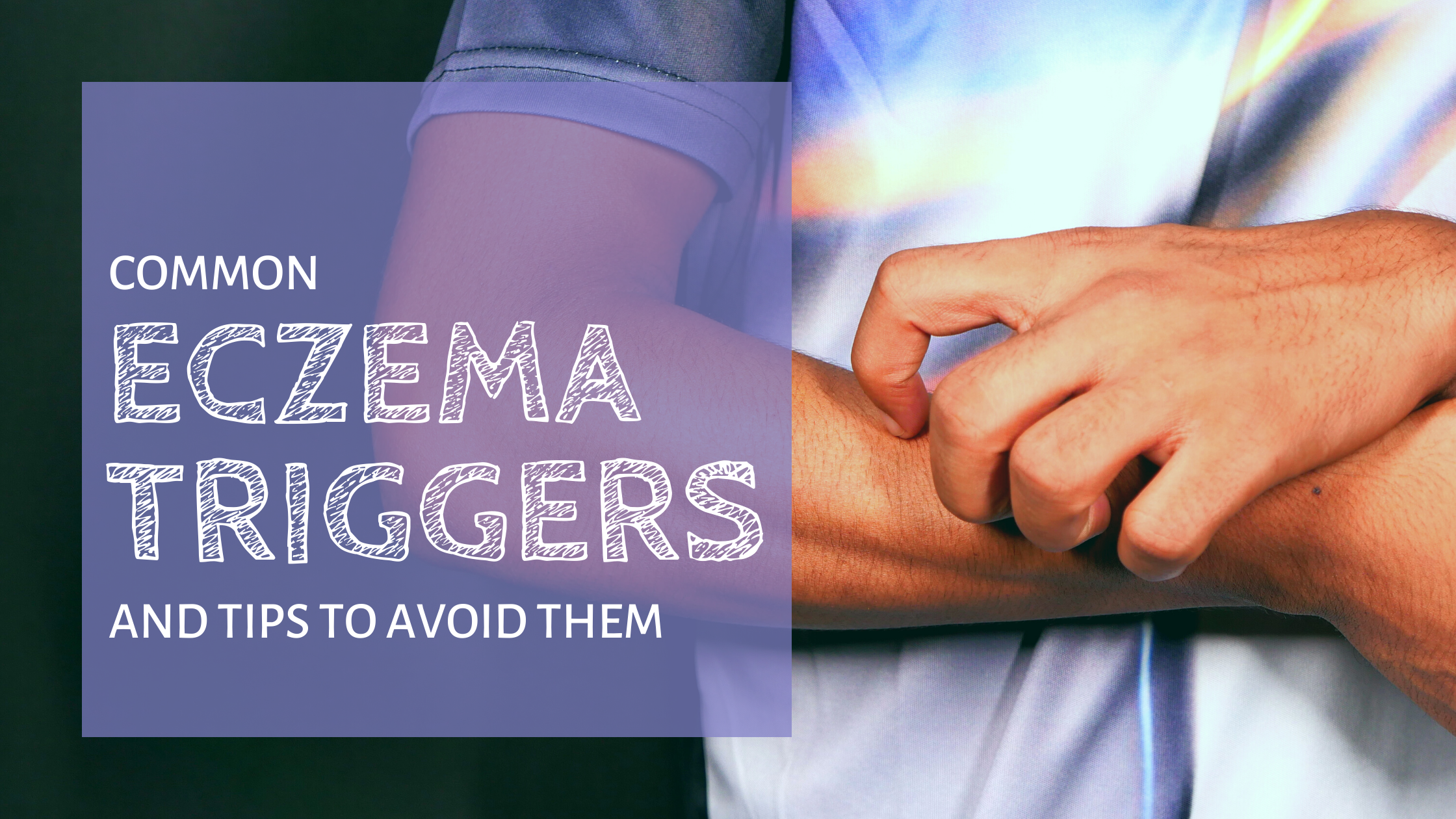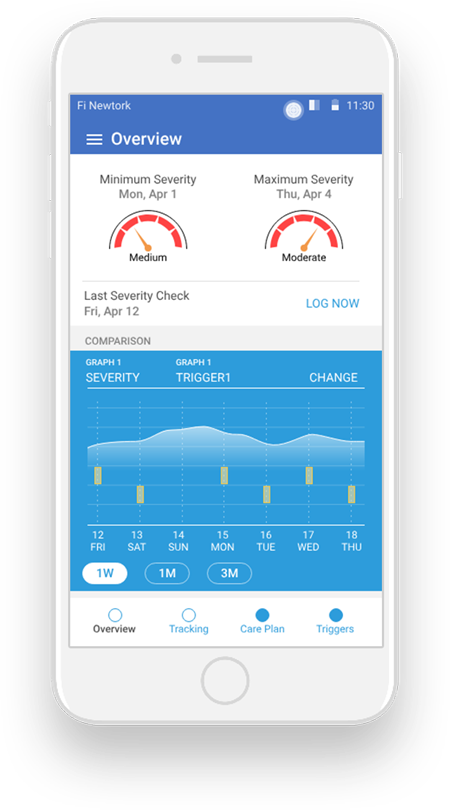Top eczema triggers to avoid

- Introduction
- How does Eczema skin differ from normal skin?
- What are common eczema triggers?
- Tips to avoid Triggers
Introduction
Although eczema is one of the commonest chronic skin diseases, we still don’t know what exactly causes eczema. Researchers believe that a combination of genetic causes and trigger factors play a role in most types of eczema. You may be born with an increased likelihood of developing eczema because of the genes you inherit from your parents.
Those of you with eczema tend to have an over reactive immune system. It can get triggered by both intrinsic (inside the body) and extrinsic (outside the body) substances. The response to the substance is inflammation. Inflammation leads to red, itchy skin lesions common to most types of eczema.
How does eczema skin differ from normal skin?
Normal skin provides a healthy protective barrier which prevents skin from drying out and fights off infections. This barrier is made by a protein called filaggrin. Research shows that there is a mutation in the gene which creates filaggrin in some people with eczema. As filaggrin is not there to build a strong skin barrier, the moisture from your skin can escape outside leading to very dry skin. Because of the defective barrier, bacteria and viruses can enter in, making your skin infection prone.
The goal of eczema management is to keep your symptoms under control. You have to feel comfortable and stay healthy while living with eczema, because eczema has no cure and it can cause flares from time to time. Prevention of getting a flare can be challenging. To prevent a flare we have to identify the potential triggers which causes a flare.
What are the common eczema triggers?
It may be difficult to detect a trigger because a flare can occur sometime after exposure and not directly after. This time lag can make it difficult to detect some of the triggers which causes our eczema flare.
We have to keep in mind that eczema affects everyone differently. What triggers a flare in you is not the same for another. You may experience the symptoms of eczema in different regions in your body and at certain times of the year.
Common eczema triggers are;
- Dry skin – If your skin gets very dry, it becomes scaly, rough and brittle easily. You may get a tight feeling. These features can lead to an eczema flare.
- Irritants – some substances can act as irritants to our skin. These can be found in the everyday products we use and even in natural substances that come in to contact with our skin. We use most of these products on our body and in our homes in our day to day lives. These irritants can make our skin itch and burn or become red and dry further. Because in eczema we already have a sensitive skin with a defective barrier.
These irritants can be;
- Hand and dish soap, shampoos, body wash, bubble bath
- Laundry detergents, surface cleaners, disinfectants and other household cleaners
- Some natural liquids such as juice from fresh fruits, vegetables and meat.
- Metal ex: Nickel (found in watches, kitchen ware, jewelry, batteries etc.)
- Fragrances and perfumes
- Cigarette smoke
- Antibacterial ointments ex: Bacitracin, Neomycin
- Certain fabrics such as wool, polyester and other synthetic fabrics
Track and Manage your Eczema treatment using a comprehensive Eczema App
Download Eczemaless now
Here are some potential chemicals which can irritate our skin and cause an eczema flare up.
- Isothiazolinone – it is an antibacterial product found in some personal care products ex: baby wipes
- Formaldehyde – it is found in glues, adhesives, household disinfectants and some vaccines
- Paraphenylene-diamene – found in temporary tattoos and leather dyes
- Cocamidopropyl betaine – found in shampoos and lotions
These substances can irritate your skin when it comes into contact with them or when you touch them.
- Environmental factors – cold or dry weather conditions, humidity and dampness, house dust mites, molds, pollen and pet dander may act as triggers to give a flare.
Most of these are air borne allergens. Allergens are substances which cause an allergic reaction.
- Food allergies – allergens in certain foods can trigger eczema.
Ex: Cow’s milk, pea nuts, soya, eggs, wheat, gluten, shell fish
As each one with eczema is different, whether you are allergic to such food items and to what food items, differ from one patient to another. Some eczemas are not related to food allergies at all. Be mindful of what you eat if you know that certain foods can trigger your eczema.
- Stress – emotional stress is found to be a trigger for eczema flares. The exact cause of how stress affects eczema is not sure. Symptoms may worsen when you are feeling ‘stressed’. Knowing that you have eczema which is a chronic skin disease can also stress you which can lead to a flare up. Living with eczema can be challenging and it can affect our emotional wellbeing. The appearance of the skin rash is not only embarrassing but it can lead to severe itching and sleepless nights.
Stress and anxiety are well known triggers of eczema because when we experience a stressful situation, our body switches to a ‘fight or flight’ mode which increases the production of stress hormones such as cortisol and adrenaline. They can suppress our immune system and cause an inflammatory response in our skin, leading to a flare.
- Hormonal changes – Eczema flares can occur and symptoms may worsen during certain times in women because of their hormonal changes.
Ex: prior to the periods, during pregnancy and breast feeding
- Skin infections – when germs get in to your skin, it can trigger an eczema flare. Eczema skin may develop fissures and small cracks on the surface. These act as entry points to various bacteria (staphylococcus, streptococcus), viruses (HSV) and even fungi. Infection can make eczema worse and treatment becomes more difficult. Your skin will get more damaged which leads the way to further infection. Therefore, breaking this cycle of infection is a key to successful management of eczema.
- Heavy workouts and exercise can lead to increased sweating leading to eczema flares. For people with eczema, heavy exercise can dry out their skin through loss of fluids. Sweat has sodium which further can dehydrate your skin while irritating and making it sting. As the skin surface temperature soars with exercise, it can trigger frenzied scratching in people with eczema. This can damage your skin and lead to a flare.
If you have symptoms that worry you, seek help from your doctor or a dermatologist. It is best to maintain a diary, so that you can discuss what the possible triggers are and the ways of avoiding these triggers with your doctor. Apart from complying with the treatment regime, it is a must to identify what triggers a flare up and try your best to avoid them.
Some tips to avoid triggers
- Identify the triggering foods and avoid them in your diet
Maintaining an eczema friendly diet is the key to keeping your symptoms under control. There are certain foods which help to reduce eczema symptoms. They are known to be anti-inflammatory foods. Studies have demonstrated that these can fight inflammation.
- Fatty fish – Fatty fish contain long chain omega 3 fatty acids, EPA and DHA and are a rich source of protein. EPA and DHA can reduce inflammation.
Ex: Salmon, Mackerel, Anchovies, Herring
- Berries – Berries contain antioxidants called anthocyanin which have anti-inflammatory properties.
Ex: Blue berries, Black berries, Raspberries
- Avocados – rich in vitamins, minerals, monounsaturated fats, carotenoids and tocopherols which are good anti-inflammatory agents.
- Cruciferous vegetables – They are rich in antioxidants which fight inflammation.
Ex: Broccoli, Kale, Cauliflower, Brussels sprouts
- Green tea – it is a healthy beverage with anti-inflammatory properties
- Peppers – They are rich with antioxidants and strong anti-inflammatory properties.
Make sure to avoid foods like fried foods, junk foods, processed meats, refined carbohydrates and Trans fats because they are linked with increased levels of inflammation. They may play a role in worsening your eczema.
- Keep your home allergen free, vacuum regularly, wash your bed linen at least once a week, replace carpets with hard wood floors so that you can mop your floor to keep it dust free and clean.
- To avoid your skin becoming too dry during winter months, use a humidifier at home. Moisturize your skin more than usual in cold months to prevent drying.
- Manage your stress well – practice yoga, meditation and other relaxation techniques
- Use gloves when using detergents and house hold cleansers. Avoid touching chemical irritants unnecessarily.
- Use hypoallergenic scent free body products
- Choose fabrics which doesn’t trigger symptoms such as itchiness and redness. You can wear an extra layer of non-irritant garment like cotton, under your wool garments.
- You can do low intensity work outs in cooler times of day such as early morning or evening. Keep a fan nearby to evaporate the sweat.
Managing your eczema can be challenging. Keep track of your day to day activities. Identify what worsens your symptoms. Take necessary steps to reduce exposure to these triggers. With time you may notice an improvement in your skin and flares will be much less.
References:
- https://nationaleczema.org/eczema/causes-and-triggers-of-eczema/
- https://nationaleczema.org/eczema-emotional-wellness/
- https://www.nhs.uk/conditions/atopic-eczema/causes/
GET IN CONTROL OF YOUR ECZEMA
Use our AI tool to check the severity of Eczema and keep track of your Eczema progress.



